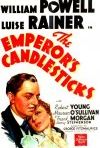
THE EMPEROR’S CANDLESTICKS
US, 1937, 89 minutes, Black and white.
William Powell, Luise Rainer, Robert Young, Maureen O’ Sullivan, Frank Morgan, Henry Stephenson, Douglass Dumbrille, Frank Conroy.
Directed by George Fitzmaurice.
The Emperor’s Candlesticks is one of those adventure fantasies set in 19th century Europe – akin to The Prisoner of Zenda. This time the candlesticks are to be transported from Vienna to St Petersburg. They have a secret hiding place for notes and two different notes are hidden. They are to be transported by a suave Polish spy (William Powell) and a Russian spy (Luise Rainer) to St Petersburg. Through a series of adventures on the train journey from Vienna to St Petersburg, they are stolen by the countess’s maid and an accomplice, sold to an antique shop, transported from Budapest to Paris to an auction house in London. The film focuses on clashes between the Poles and the Russians in the 19th century, the abduction of the Crown Prince in Vienna and his being held as a ransom for the release of a Polish agitator.
William Powell does his usual suave manner as the Polish baron. Luise Rainer, after her Oscar-winning performances in The Great Ziegfeld and The Good Earth, is the Russian spy. Frank Morgan does his usual bluff role as the Grand Duke’s adviser. Robert Young is the Grand Duke and Maureen O’ Sullivan the daughter of the Polish agitator who lures the Crown Prince for his abduction. A lot of regular MGM supporting players are in supporting roles.
The film is quite farfetched – but that does not matter in terms of the impact of the stars, the cat-and-mouse games in pursuing the candlesticks and getting them to Russia.
The novel on which the film was based was by Baroness Orczy, the author of The Scarlet Pimpernel.
1. An entertaining political fantasy? Espionage in the 19th century? The Austro-Hungarian? empire and the Russian empire?
2. The black and white photography, the re-creation of period, the lavish Vienna sequences, Moscow? The trains, Budapest, Paris, London, the Polish and Russian countrysides? The musical score?
3. The title, the focus on the candlesticks, the secret hiding place? The messages? The needs for the Poles and the Russians to have the candlesticks?
4. The opening, the Polish plot in Vienna, the men assembled at the opera ball, the Grand Duke in disguise, his adviser? Romeo and Juliet? Maria posing as Juliet, leading the Grand Duke on, his leaving the ball, his being imprisoned by the Poles? His being persuaded to write the letter to his father, the persuasion because of his attraction to Maria? The Polish situation with Maria’s father in prison in St Petersburg? The importance of getting the letter to the tsar? The decision to ask Baron Wolensky? Mr Korum and his visit to Wolensky, persuading him to take the letter? Wolensky’s reputation as a spy?
5. The introduction to the Countess Mironova, her reputation as a Russian spy? Her going to see Prince Johann? The candlesticks, the decision for her to take them? Passing Wolensky on the stairs? The train, her going on the earlier train? Her maid, her accomplice, the plan, stealing the jewels and the candlesticks? Her being distraught, the notice at the station?
6. Wolensky, Prince Johann, taking the candlesticks, hiding the letter? Prince Johann keeping them, his change of mind? Wolensky, trying to track the countess? Reading the notice? In the hotel, their interactions, cat-and-mouse, the dinner? The baron seeing the maid and remembering that she could be the criminal? The arrest of her accomplice? No candlesticks? The baron going to Budapest, the countess following him? The antique dealer, the sale to Paris, their going to Paris together, the futile search, to London? The baron and his bidding at the auction, the countess arriving, outbidding him? Their combining the finances? The baron taking the wrong candlestick?
7. The baron discovering the letter for his immediate arrest? The interactions with the countess? The confrontation, getting back his letter? The explanation of the mission? His going to Russia alone?
8. The countess, going back to Russia, admitting defeat? The official coming to her house, her being under arrest, the arrival of the baron? Their both being taken to the tsar, the tsar admiring their courage, their love, pardoning them?
9. The baron and the various means of getting the letter to the tsar, the device of focusing on the pockets and sleeves, the feet of all those involved in getting the letter? the pardon and the release of the prisoner?
10. The Grand Duke and his assistant, in the abduction hotel, their luggage, the food, Maria and the talking with the Grand Duke? Their being released?
11. The happy ending – romantic pseudo-historical novels and their appeal?